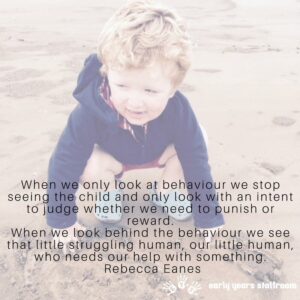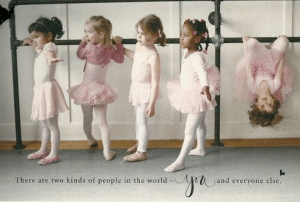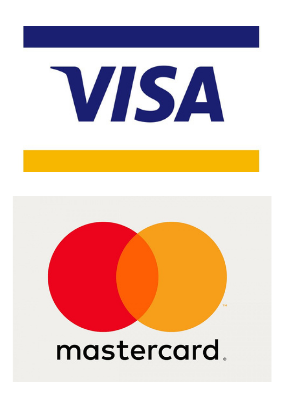Do we need Behaviour Management in Early Years? Or should we banish this in favour of Self-Regulation?
Do we want children who are compliant or children to do the right thing because they believe it is?
Do we want children to ask questions? To wonder? To ponder? To think outside the box? To learn independently? Do we want to be challenged? If not, why not? Do we want children to problem solve? It is these long-term goals, life skills, that we as Early Years Teachers should be focusing on, not the short-term, compliance goals that we are conditioned to believe is ‘good behaviour management’.
Why are we so focused on what they do and not who they are? If you see a child sitting there listening and watching and not moving do you think they are engaged? Or just being compliant? How will they learn more?
We need to resist the temptation for control…
Don’t look at the behaviour, look at the child. What are they trying to tell you through their behaviour?
There are two things to consider before behaviour management and that is:
1) Do we really understand what children’s behaviour means?
2) Is our teaching and learning interesting to them?
If I am teaching and children don’t behave I don’t blame them, I blame me! I adapt my teaching to ensure that the children are kept interested or I may ignore the unwarranted behaviour so as not to disrupt the flow and here is why.
Children often display poor behaviour when their emotional needs are not being met. The behaviour is like saying ‘I have a need, and no one is meeting that need’. For example, if a child cannot sit still, why can they not sit still? Are they too young, bored, need the toilet, hungry, thirsty?

What does behaviour really mean?
A child who is talking when you are talking could mean the child has something so exciting that has popped into their mind and they need to share it instantly. They do not know how to stop it, they do not mean to be rude.
A child screams with excitement may mean they are so excited about what you are about to do they cannot control the outburst, something so exciting that has popped into their mind and they need to share it instantly. They do not know how to stop it, they do not mean to be rude.
A child will not share? Children are not made to share. It is ideal to have a space in the room where children can store their own toys or comforter that they keep there for example a tray. This gives them some sense of belonging and comfort and allows them to develop a sense of ownership. Also, if they know their one special toy is safe they are more likely to be willing to share / take turns with the other resources. Ask children to share out plates, cups etc. at snack times, model being polite. Be positive when someone shares something for example say, ‘I like how you took turns on your own.’. Play board games so children understand how to take turns and do circle times on children not getting a turn, how that feels etc. Teach children how to say no if someone tries to take a toy from them.
A child hits another child means the child cannot communicate their needs or they could be hungry, tired or ill?
Biting is more common in younger children under 3 but can happen with older children. It is distressing for parents and potentially very serious. We need to explain to children it is not OK to bite themselves or others. It is a good idea to observe a child who bites closely to find out what happens before, after etc. to gain more of an understanding of why this happens and to resolve the problem that is causing the effect (biting). Have a water tight biting policy that is followed by all staff and shared with parents to ensure you deal with these matters effectively.
What can I do to support children to support self-regulation?
Teach children to be calm
Children need time to calm down, think about their actions, reflect on their feelings and a safe person to talk to about these who can help them understand what has happened, this is called co-regulation. Children need to learn from their mistakes by themselves. Practise mindfulness as often as possible.
Teach children to communicate their needs
This can be done through being available to support communication in play and in circle times.
Teach children to negotiate, compromise and deal with conflict
Breathe and be calm. Mindfulness will help with this. Explain to the children we are going to talk about this and work it out. Acknowledge the child’s feelings, for example, say ‘I can see you are sad’. Ask open ended questions to get to the problem and repeat child’s words back. Ask children for ideas to solve the problem. Check children are OK with the solution. Tell the children ‘That is great you solved the problem’. Children will quickly gain confidence in their problem-solving skills.
Recognise children as individuals with physical needs
We need to remember that children have physical needs. If children are being very physical; throwing, kicking, hitting they are showing their physical needs are not being met. Give them ways to express themselves by being outside with balls, throwing games, building, sweeping etc. children can learn as much from this as from inside activities.
Boundaries
Knowing that they have boundaries makes children feel secure and safe and develops a sense of justice and fairness. The behaviour milestones are outlined in Development Matters for Children in Early Years. Therefore, before we begin we need to ensure our expectations are realistic. It states that children need to learn to manage their own behaviour but there may be times when adults need to give consequences. Set clear boundaries which are fair and consistent. These need to be created by children, parents and educators together. Ensure consequences such as reflection time are fair and all adults use the same for the same things.
If this, and other positive approaches are not being successful it is a good idea, with parent permission to gain support from your SENCO team.
Give Choices
Providing young children opportunities to use their voices, make decisions, develop ownership, and solve problems are great ways to build relationships.
Children need adults to provide structure and make key decisions. It helps them feel safe. While it’s great to give children a say in things, too many or too big of choices can overwhelm them or put too much pressure on them.
Give young children the choice between only two things. If they don’t or can’t pick between the two, don’t offer a third. They need to choose, for example, ‘You can choose to tidy up the dough area or the home corner’.
Additional benefits for giving children choices include the facts that when given choices, children can learn to make sacrifices. Allowing children to learn the value of sacrificing one thing for another helps children become responsible for their actions.
Circle Times
Use circle times to focus teaching of, arguably, the most important area of learning; Personal, Social and Emotional Development.
Build Good Relationships
Positive behaviour is built on respectful relationships and good communication. Children can use negative behaviour if these needs are not being met at home or school.
Smooth Routines and Transitions
Keep routines the same each day and explain to children ahead if there will be a change in routine. As changes to routine can make children feel insecure and they may display negative behaviour.
Don’t let children wait too long for example for others to finish eating, to go to the toilet etc. do in small groups to minimise children getting bored and upset.
Let it go!
If some unwanted behaviour is really minor for example talking when you are talking just let it go. If children are constantly told ‘don’t do this, don’t do that’ they will feel really negative however it is important to insist on non-negotiables.
Finally I want to leave one thought with you, a message for all children; ‘Be good, but most importantly be you’.

Recommended Further Reading
Unconditional Parenting by Alfie Kohn
Boys, Getting it right from the start by Linda Tallent and Gary Wilson










